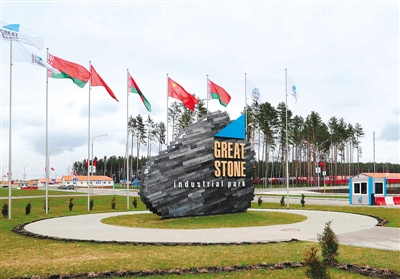B&R a backlash on protectionism

Pictured above is the entrance of the China-Belarus Great Stone Industrial Park. Located on the outskirts of Minsk, capital of Belarus, the park is honored as the pearl of the Silk Road Economic Belt. (PEOPLE’S DAILY ONLINE)
The Blue Book of the “Belt and Road:” Annual Report on the Development of the Belt and Road Construction was released in Beijing on April 11. In its general report, Li Yongquan, director of the Belt and Road Research Center at the Chinese Academy of Social Sciences (CASS), said that B&R is the road that will lead to the community of shared future for mankind.
Since it was put forward, the “B&R” initiative has gained understanding from an increasing number of countries and international organizations, with its concept of cooperation being widely accepted. The original intention of the initiative is to promote domestic reform and opening up as well as economic cooperation between China and neighboring countries and the world, not to participate in the so-called geopolitical game. China has proposed that the “B&R” initiative should be jointly built through consultation to meet the interests of all. It is meant to embark on a road of mutual development, Li said.
The “B&R” initiative is a powerful response to the measures adopted by some Western countries to implement unilateralism and protectionism, said Sun Zhuangzhi, director of the Institute of Russian, Eastern European and Central Asian Studies at CASS. The initiative is in line with the development aspirations of all countries, and it will help countries to seize opportunities and achieve their own development under new historical conditions through planning and practice in economic and humanities cooperation. As the coverage of the “B&R” initiative and the issues for cooperation has become increasingly extensive, it is necessary to further achieve consensus in the future, make breakthroughs in key areas and form demonstration projects to further drive the development of related countries, Sun said.
Kong Dan, president of the CITIC Foundation for Reform and Development Studies, said that the initiative has contributed a formula that is rich in Chinese wisdom for the world economy to recover from its long-term downturn. It has promoted international economic cooperation through the principles of mutually beneficial cooperation and joint construction through consultation to meet the interests of all, and has stimulated the potential for economic growth of all parties involved in cooperation, facilitating the sustainable development of international economic cooperation.
“The construction of the B&R is progressing from landing on the soil and blossoming to having deep roots and luxuriant leaves,” said Zhang Hong, a research fellow at the Institute of Russian, Eastern European and Central Asian Studies at CASS. It is necessary to build a new type of international relationship with mutually beneficial cooperation as the core, promote the construction of economic corridors, deepen interconnection and industrial cooperation, and improve the financial security system.
We need to build an open cooperation platform to promote open, inclusive, universally beneficial, balanced, and mutually beneficial economic globalization while remaining committed to innovation-driven and green development, establishing a multi-level mechanism for humanities cooperation, building more livelihood projects for the people, and promoting inclusive development of society, Zhang said.
(edited by CHEN ALONG)
